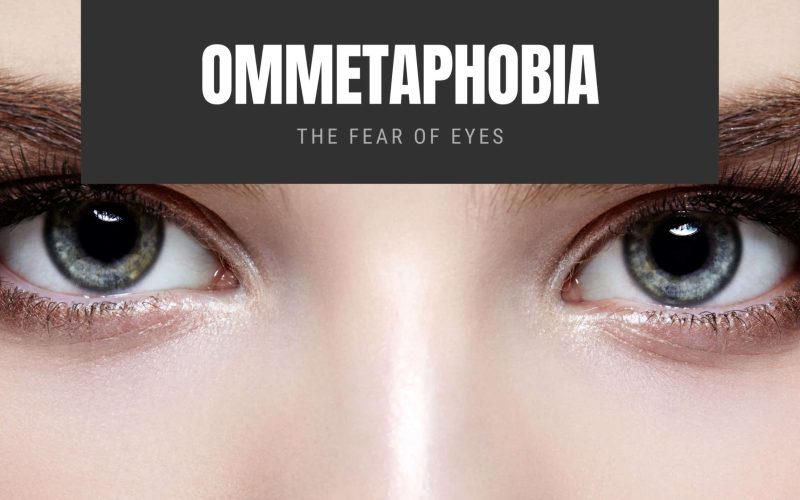Ommetaphobia is an irritational fear of the eyes. The word comes from two Greek words: “ommeta,” which means eyes, and “phobia,” which means fear or deep aversion.
People who have this type of phobia are scared of eyes and are also extra concerned about their own eyes.
Popularly known as Ommetaphobia, this phobia goes by another name, also called ommetaphobia.
This phobia is usually common, although it’s hard to notice. People of age, race, social status, religion, and family have this phobia.
Ommetaphobes are triggered by seeing-eye diagrams, looking straight up at people’s eyes when they speak, being looked in the eyes directly, astigmatism, or getting things like sand or dirt in the eyes.
At some point, a major fraction of people around the globe suffers from ommetaphobia.
People with ommetaphobia are extremely concerned about their eyes, so they avoid touching them, plucking their eyelids, or applying eye drops to their eyes. An alight issue with their eyes and a visit to an ophthalmologist will trigger a panic attack in their mind.
Symptoms of Ommetaphobia
One of the common symptoms of people with one phobia or the other is a panic attack and anxiety. The symptoms they experience depend on their level of fear, and it varies from person to person.
Some Physical symptoms are unsteady feelings, dizziness, excessive trembling and shaking, sweaty hands, anxiety when thinking of eyes, palpitations, obsessive thoughts of eyes, hot or cold flashes, shortness of breath, numbness, elevated blood pressure, and inability to speak.
Aside from these physical symptoms, there are also some psychological symptoms experienced by ommetaphobes, amongst which are Embarrassment, disconnection from reality, fear of death, and isolation.
Ommetaphobes sometimes may suffer from depression and social anxieties. It is very difficult to talk about one’s fear, and if not taken care of properly, it may affect our relationship with others and our career.
It is pertinent to note that there is no guaranteed cure for Ommetaphobia your ability to get over the fear solely depends on the severity of the phobia.
Causes of Ommetaphobia
There is no definite cause of this phobia. People who are ommetaphobic may not even have a simple explanation for this phobia.
However, these phobias arise from external events, internal predispositions, genetics, hereditary, brain chemistry, and movies.
- External events: Traumatic experiences at an early age can trigger this kind of phobia.
- Genetics: Having a family with specific phobias and anxiety disorders can increase one’s risk of having emetophobia due to a genetic disposition. With such genetic traits, once they experience some traumatic event, they develop full-blown ommetaphobia.
- Learned response: Ommetaphobes may have been around someone with such fear, and they pick it up from the person. It may be their parents, older siblings, grandparents, or other relatives who are constantly anxious and worried about their eyes.
- Movies: movies with ghosts, villains, and horror with terrifying eyes can trigger this phobia.
How to Deal With Fear of the Eyes Phobia?
There are no prescribed medications that can stop this phobia. Drugs taken can only help suppress your fear a little but won’t eradicate it.
Thankfully, there are ways to deal with this phobia, preventing it from affecting our personal and social lives totally.
Talk to a trusted friend or family member about your phobia. It is extremely difficult to expose our fears to others, but talking to someone helps a lot.
Explaining how you feel and what makes you feel that way enables the person to decide how to help you out. The person may be your parents, older siblings, relatives, or even your friends.
Therapy
One of the popular therapies people use in overcoming their phobias is cognitive behavioral therapy.
This therapy involves understanding and finding the connection between your feelings, behavior, and panic attacks.
There are different variations of cognitive behavioral therapy, one of which is desensitization.
Desensitization is also known as exposure. In this therapy, you are exposed to your fears slowly and repeatedly.
Through this exposure, they realize that though this phobia may be unpleasant, it isn’t harmful. Constant exposure gives you a sense of control over your fear.
Self Adoption
There are a couple of things that you can do yourself to help you manage your phobia.
Try learning techniques that can help you cope with anxiety symptoms and panic attacks. Techniques like taking deep breaths, writing down your fears, visualizing, and affirming help reprogram your mind to overcome fear.
Join support groups online. You can find people suffering from Ommetaphobia online. Ask your physician to help you join such groups, especially a peer group.
Self-help Books and Online Programs
Equipping yourself with adequate knowledge of Ommetaphobia goes a long way in helping you face your fears.
Reading books based on the principles of cognitive-behavioral therapy can help you understand the cause of your fear and face it. These books can be found in libraries or online.







